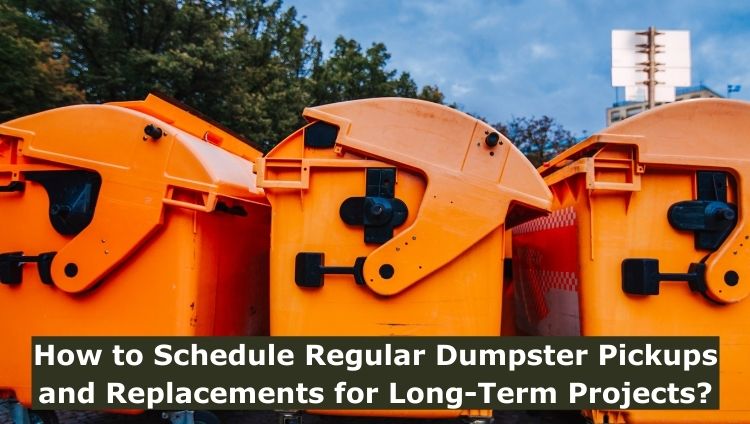Schedule Regular Dumpster Pickups and Replacements to maintain a clean and organized work area during long projects. This ensures proper waste management and keeps the site running efficiently.
Whether you’re in charge of a construction site, a renovation project, or anything that makes a lot of trash, having a good schedule for picking up and replacing dumpsters is really, really important.
Here’s a step-by-step guide to help you about How to schedule regular dumpster pickups and replacements for long-term projects?
1. Figure Out Your Trash Needs
Before creating a schedule, you need to assess your waste disposal needs. Consider the following factors:
- The type and volume of waste generated daily or weekly.
- Any hazardous materials or special waste that require separate disposal methods.
- Local regulations and permits for waste disposal.
2. Choose the Right Dumpster Size
Selecting the appropriate dumpster size is essential. It should be large enough to handle your waste volume but not so large that it remains partially empty, wasting money and space.
Related Post: How to Choose the Right Dumpster Size for Your Project?

3. Find a Reliable Dumpster Rental Company
Research and choose a reputable dumpster rental company in your area. Look for companies with a history of punctuality, competitive pricing, and good customer service.
Obtain quotes and compare rates to ensure you’re getting a fair deal.
Related Post: How to Choose a Dumpster Rental Company?
4. Make a Schedule for Pickup and Replacement
Once you’ve selected the ideal dumpster size and service provider, it’s important to develop a tailored plan. Keep these key points in mind when organizing your schedule:
- Align pickup and replacement frequencies with your waste volume and the size of your dumpster. For long-term projects, weekly or bi-weekly pickups are typically appropriate.
- Arrange pickups and replacements at times that will minimize disruptions to your workflow.
- Consider holidays or special events that could impact your project timeline, as the dumpster service may have adjusted hours during those times.
Related Post: How to Schedule a Dumpster Rental Online?

5. Communicate with Your Dumpster Provider
It’s essential to maintain open communication with your dumpster rental provider. Notify them promptly if there are any changes to your plans or if you expect to generate more waste than initially anticipated. Furthermore, if you need additional containers or have specific disposal requirements, be sure to convey these details. The company is dedicated to supporting you throughout the entire process.
6. Keep an Eye on Your Schedule
Regularly review your schedule to ensure it aligns with your project’s waste generation rate.
Adjust the schedule as necessary to avoid overflowing dumpsters or unnecessary pickups, which can incur additional costs.
7. Be Safe and Follow the Rules
Adhere to all local regulations and safety guidelines when scheduling dumpster pickups and replacements.
Ensure that hazardous materials are properly handled and disposed of according to the law.
Related Post: Waste Management Dumpster Rules

8. Budget and Cost Control
Monitor your budget diligently. Regularly assess your expenses for waste management and adapt as necessary to remain within your financial limits. This could entail bargaining for pricing with your dumpster provider or refining your waste disposal methods.

9. Coordinate with Your Team:
Make sure all team members are aware of the dumpster schedule and the importance of proper waste disposal. Encourage everyone to follow waste segregation guidelines to reduce contamination and disposal costs.
10. Document and Record-Keeping
Maintain records of all dumpster pickups, replacements, and related expenses. This documentation will be useful for tracking expenses, auditing, and future project planning.
Frequently Asked Questions
How often should I schedule dumpster pickups and replacements for my long-term project?
The frequency of dumpster pickups and replacements depends on your project’s waste production rate and the capacity of the dumpster. Typically, weekly or bi-weekly pickups are common for long-term projects.
How do I determine the right dumpster size for my project?
To choose the right dumpster size, you should consider the volume of waste generated by your project. It should be large enough to handle your waste but not so large that it remains partially empty, wasting space and money.
How can I find a reliable dumpster rental provider in my area?
Research local dumpster rental companies and look for ones with a history of punctuality, competitive pricing, and good customer service. You can obtain quotes from several providers and compare rates to ensure you get a fair deal.
What should I consider when setting up a pickup and replacement schedule?
When creating your schedule, consider factors like the frequency of pickups, timing to minimize disruptions, and any holidays or special events that might affect the schedule due to altered operating hours.
How can I communicate effectively with my dumpster rental company?
Maintain open lines of communication with your dumpster provider. Notify them of any schedule changes, adjustments in waste production, or specific requirements, such as additional containers or special waste disposal.
What should I do if I notice my schedule isn’t working as expected?
Regularly review your schedule to ensure it aligns with your project’s waste generation rate. If needed, make adjustments to avoid overflowing dumpsters or unnecessary pickups, which can lead to additional costs.
Are there any safety and compliance considerations when scheduling dumpster pickups?
Yes, it’s essential to adhere to all local regulations and safety guidelines when scheduling dumpster pickups and replacements. Ensure that hazardous materials are handled and disposed of according to the law.
How can I control the budget for dumpster pickups and replacements?
Keep a close eye on your budget by regularly reviewing your waste management costs. You may need to negotiate pricing with your dumpster provider or optimize waste disposal practices to stay within budget.
Why is it important to coordinate with my project team regarding the dumpster schedule?
Coordinating with your team ensures that everyone is aware of the schedule and understands the importance of proper waste disposal. Encourage team members to follow waste segregation guidelines to reduce contamination and disposal costs.
Conclusion:
In large-scale projects, keeping the workspace clean is essential, which involves efficient dumpster management. Careful planning and clear communication ensure that everyone knows their responsibilities, while flexibility allows for changes to handle unforeseen issues. Proper waste management helps maintain a safe and organized project site.
Moreover, it’s not only about maintaining cleanliness; adhering to environmental regulations is crucial. Effective waste management promotes eco-friendliness and can result in long-term cost savings.
To discover improved ways to handle garbage, visit our blog.


